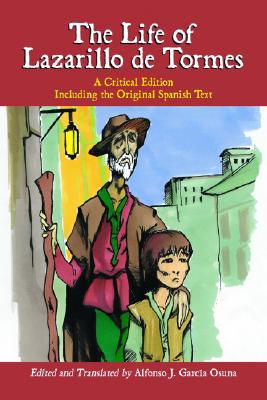

 |

|

The average rating for The Life of Lazarillo de Tormes : A Critical Edition Including the Original Spanish Text based on 2 reviews is 4 stars.
Review # 1 was written on 2011-11-29 00:00:00 Maureen Wobig Maureen WobigThis first picaresque "novel"--more of a novella really--is an excellent introduction to the genre and a good book on its own merits. It is also funny (I laughed out loud more than a few times, and I don't do that for anybody but Wodehouse), the atmosphere is realistic and gritty, filled with memorable character portraits (the down-at-heels gentleman who would rather starve than reveal his shameful poverty is a particularly notable--and characteristically Spanish--example), and the overall tone of the novel is delightfully ironic. Lazarillo begins life as a desperately poor urchin who survives through his intelligent estimation and manipulation of others, but, by the end of the book, when he has attained a modicum of comfort and stability, he allows even this small bit of status to fill him with illusions, convincing him that his dubious office of town crier is actually respectable, and leading him to believe that his wife is faithful, even though she is obviously the mistress of the the local priest. In spite of this, though, we don't despise him, because through all he is resourceful and compassionate and filled with great good humor. |
Review # 2 was written on 2017-05-01 00:00:00 Old School Old SchoolRubens' painting of "Democritus and Heraclitus" was before my inner eye, and Juvenal's following words rang in my head while reading this hilarious, picaresque road trip through 16th century Spain: "The first of prayers, best known at all the temples, is mostly for riches... Seeing this then do you not commend the one sage Democritus for laughing... and the master of the other school Heraclitus for his tears?" What can a philosopher do, but laugh - and cry - at the state of the world shown in this panorama of greed, hunger, violence, laziness, lust, and dishonesty? What can one do but shake one's head at the prejudice and false sense of honour that guides the men and women in this tale of changing masters, where the hero is going from bad to worse, while rejecting anything looking like a decent life if it includes effort, work, stability and honesty? On the road, Lazaro learns the hard way how to cheat to get himself a meal when he is faint with hunger. He sees the moral decline of the clergy he encounters, and passes his days looking for short-term solutions to better his own life conditions, yet is not willing to face real responsibility. He sees through the fake attitudes of the honour-bound aristocracy and of the fraudulent priests enriching themselves by selling false indulgences (- as if there were any "real" ones, adds the laughing philosopher), but he is not interested in real change, only looking for a niche in the system where he can fit in and live his life in intellectual laziness and relative material comfort. In the end, he finds an adequate solution: marrying the mistress of a priest, and living off his generosity, silently accepting the nightly absences of his wife. I read this against the foil of the 16th century crisis in the Catholic Church, facing corruption and schism on a level unheard of before. And the picaresque novel clearly outlines the matters that make the weeping philosopher sigh, while applying the method of the laughing philosopher - to turn it into a sarcastic sense of humour. However,coming to the end of the novella, I lean back and think that not much has changed since then, despite our perceived development and liberal society. Corruption, prejudice, inequality, fake facades, honour codes, quick fixes without serious positive impact - all of that is scarily present still. And while I am laughing at Lazaro's strange road trip, I am weeping for our young idle generation, for those who don't find a proper place for themselves, and flee into a world of irresponsible instant gratification without plans for a sustainable and fair future, whose carelessness and laziness is a product of hopelessness and disillusionment with an appallingly corrupt political, social and religious elite. We are not beyond the picaresque yet, I think, weeping a bit! |
CAN'T FIND WHAT YOU'RE LOOKING FOR? CLICK HERE!!!